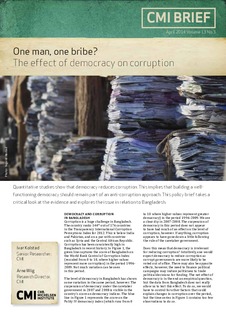| dc.contributor.author | Wiig, Arne | |
| dc.contributor.author | Kolstad, Ivar | |
| dc.date.accessioned | 2018-01-04T08:19:00Z | |
| dc.date.available | 2018-01-04T08:19:00Z | |
| dc.date.issued | 2014-04-22 | |
| dc.identifier | oai:www.cmi.no:5123 | |
| dc.identifier.citation | Bergen: Chr. Michelsen Institute (CMI Brief vol. 13 no. 3) 4 p. | |
| dc.identifier.issn | 0809-6732 | |
| dc.identifier.uri | http://hdl.handle.net/11250/2474938 | |
| dc.description.abstract | Quantitative studies show that democracy reduces corruption. This implies that building a well-functioning democracy should remain part of an anti-corruption approach. This policy brief takes a critical look at the evidence and explores the issue in relation to Bangladesh. | |
| dc.language.iso | eng | |
| dc.publisher | Chr. Michelsen Institute | |
| dc.relation | CMI Brief | |
| dc.relation | 3 | |
| dc.relation.ispartof | CMI Brief | |
| dc.relation.ispartofseries | CMI Brief vol. 13 no. 3 | |
| dc.relation.uri | https://www.cmi.no/publications/5123-one-man-one-bribe | |
| dc.subject | Bangladesh | |
| dc.title | One man, one bribe? The effect of democracy on corruption | |
| dc.type | Report | |
